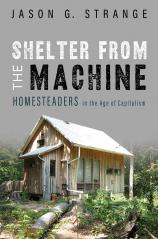Shelter from the Machine: Homesteaders in the Age of Capitalism
Review
Shelter from the Machine: Homesteaders in the Age of Capitalism
Seen within and from a broader perspective, modern homesteaders have much in common, even as they come from different backgrounds. In SHELTER FROM THE MACHINE, Berea College Professor Jason G. Strange explores big questions through his contact with a sampling of Appalachian homesteaders, both the locals and the newly arrived outsiders (who he sometimes, kindly, refers to as hicks and hippies).
The area Strange has honed in on is the (real but fictionally titled) region of Bear Lick, Kentucky. He has made a several-year study of this piece of Appalachia and its rugged band of non-conforming farmers, gardeners and off-the-gridders.
"Jason G. Strange explores big questions through his contact with a sampling of Appalachian homesteaders, both the locals and the newly arrived outsiders (who he sometimes, kindly, refers to as hicks and hippies)."
Some of Bear Lick’s denizens are early arrivals, children of older generations that simply lived in the harsh hills because their people had been there for generations. Others, mostly children of the 1960s, came in search of the simple life, the ideal of self-sufficiency and connection to nature. Both groups have common vision, too. Both live like peasants in an age when most Americans slavishly crave the latest tech toys and live in crowded cities in search of the almighty dollar to buy them with.
Strange picks apart the principles of capitalism and the industrial age that have driven some apparently sensible people to the homesteading alternative in Eastern Kentucky. He describes his stint in a factory where many locals choose to earn a minimal wage through hard, boring, repetitious tasks. This leads to the conclusion that the back roads and wooded hills of Bear Lick provide, for its voluntary population of homesteaders, a “shelter from the machine.” Though some homesteaders do work from home, the more they can provide for themselves, the less they must live in dread of domination by corporations, which some of Bear Lick’s residents refer to as akin to Satan himself.
Strange is the Chair of the Department of Peace and Social Justice Studies at Berea College, the first non-segregated, coeducational college in the South, founded on abolitionist principles. It is still unique, and remarkable, for offering a free four-year education. As a dedicated teacher in that setting, he is well qualified to compare in-depth the schooling of the poor to that of the affluent. He takes a hard look at capitalism, since that system is very often the inimical force providing the motivation for an individual or familial return to Edenic settings like Bear Lick. He suggests that even those residents of Bear Lick who depend on “real” jobs are also being shielded from the worst abuses of the system by openly and avidly embracing non-capitalist work --- and, with it, a vital (if unstated) kind of collective, or some would say Christian, model: sharing without profit, giving back to and receiving from one’s neighbors and one’s environment.
In both groups --- whether one calls them hicks or home people, hippies or nonconformists --- Strange finds certain significant similarities, concluding with the quiet suggestion that perhaps the important common factor among them is an unspoken wish to live “without a chief.”
Reviewed by Barbara Bamberger Scott on March 27, 2020
Shelter from the Machine: Homesteaders in the Age of Capitalism
- Publication Date: March 10, 2020
- Genres: Culture, History, Nonfiction, Sociology
- Paperback: 328 pages
- Publisher: University of Illinois Press
- ISBN-10: 0252084896
- ISBN-13: 9780252084898



